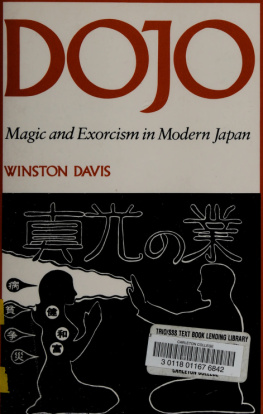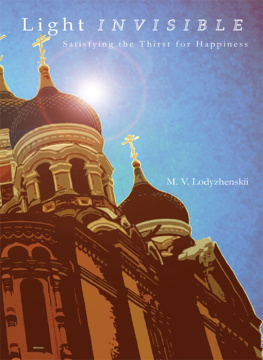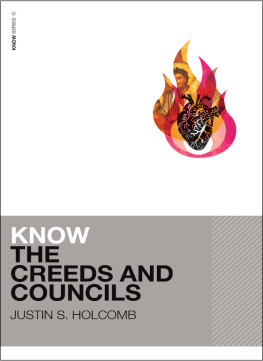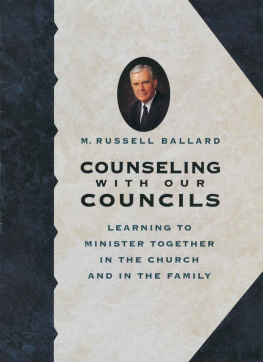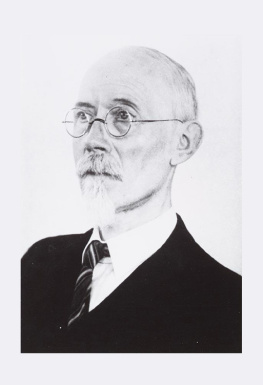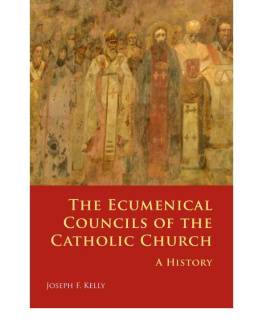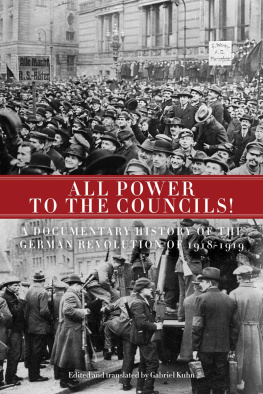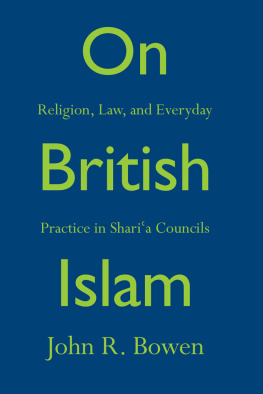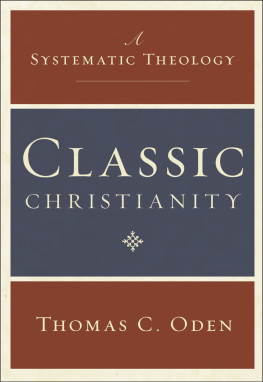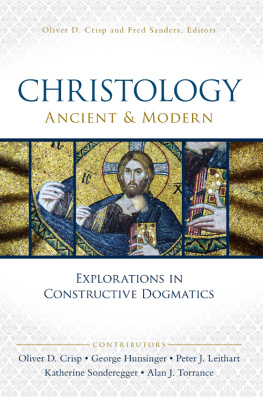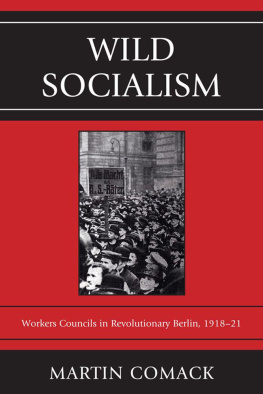Davis - First Seven Ecumenical Councils (325-787)
Here you can read online Davis - First Seven Ecumenical Councils (325-787) full text of the book (entire story) in english for free. Download pdf and epub, get meaning, cover and reviews about this ebook. year: 2017;2016, publisher: Liturgical Press, genre: Religion. Description of the work, (preface) as well as reviews are available. Best literature library LitArk.com created for fans of good reading and offers a wide selection of genres:
Romance novel
Science fiction
Adventure
Detective
Science
History
Home and family
Prose
Art
Politics
Computer
Non-fiction
Religion
Business
Children
Humor
Choose a favorite category and find really read worthwhile books. Enjoy immersion in the world of imagination, feel the emotions of the characters or learn something new for yourself, make an fascinating discovery.

- Book:First Seven Ecumenical Councils (325-787)
- Author:
- Publisher:Liturgical Press
- Genre:
- Year:2017;2016
- Rating:3 / 5
- Favourites:Add to favourites
- Your mark:
- 60
- 1
- 2
- 3
- 4
- 5
First Seven Ecumenical Councils (325-787): summary, description and annotation
We offer to read an annotation, description, summary or preface (depends on what the author of the book "First Seven Ecumenical Councils (325-787)" wrote himself). If you haven't found the necessary information about the book — write in the comments, we will try to find it.
This unique work - no other work yet available in English treats this subject - illustrates the contribution of these Councils in the development and formulation of Christian beliefs. It then shows how their legacies lingered throughout the centuries to inspire - or haunt - every generation.
Davis: author's other books
Who wrote First Seven Ecumenical Councils (325-787)? Find out the surname, the name of the author of the book and a list of all author's works by series.
First Seven Ecumenical Councils (325-787) — read online for free the complete book (whole text) full work
Below is the text of the book, divided by pages. System saving the place of the last page read, allows you to conveniently read the book "First Seven Ecumenical Councils (325-787)" online for free, without having to search again every time where you left off. Put a bookmark, and you can go to the page where you finished reading at any time.
Font size:
Interval:
Bookmark:


Cover: Constantine the Great MosaicHaghia Sophia, Istanbul
Cover design by David Manahan, O.S.B.
Typography by Richard Smith.
Copyright 1983 by Michael Glazier, Inc., Wilmington, Delaware. Copyright 1990 by The Order of St. Benedict, Inc., Collegeville, Minnesota. All rights reserved. No part of this book may be reproduced in any form or by any means, electronic or mechanical, including photocopying, recording, taping, or any information storage and retrieval system, without the written permission of The Liturgical Press, Collegeville, Minnesota 56321. Printed in the United States of America. ISBN 0-8146-5616-1.
Library of Congress Cataloging-in-Publication Data
Davis, Leo Donald.
The first seven ecumenical councils (325787) : their history and theology / by Leo Donald Davis.
p. cm.
Reprint. Originally published: Wilmington, Del. : M. Glazier, c1983.
A Michael Glazier book.
Includes bibliographical references and index.
1. Councils and synods, EcumenicalHistory. 2. Church historyPrimitive and early church, ca. 30600. 3. Church historyMiddle Ages, 6001500. 4. Theolgoy, DoctrinalHistoryPrimitive and early church, ca. 30600. 5. Theology, DorctrinalHistoryMiddle Ages, 6001500. I. Title.
BR200.D34 1990
262.514dc20
9038449
CIP
Nobody will ever write a history of Europe that will make any sort of sense, until he does justice to the Councils of the Church, those vast and yet subtle collaborations for thrashing out a thousand thoughts to find the true thought of the Church. The great religious Councils of the Church are far more practical and important than the great international treaties which are generally made the pivotal dates of historyFor in almost every case the international peace was founded on a compromise; the religious peace was founded on a distinctionthe enunciation of a principle which has affected, and still does affect, the general state of mind of thousands of Europeans from admirals to applewomen.
G.K. Chesterton

The early councils of the Church became the subject of my serious study when some years back I was asked to introduce students to their history and theology at Weston School of Theology, Cambridge, Massachusetts. Very soon I discovered that there was an inexhaustible wealth of source material, monographs and periodical literature on every aspect and in all major languages. However, I soon found too that no one had yet ventured to gather all this together in a convenient form and in English. Even though several short histories in English had appeared at the time of Vatican II, none of them did justice to the political tumult and theological speculation that gave rise to these extraordinary gatherings. The present book is an attempt to fill that void. Our study makes no pretence as originality; others have written elsewhere all that is contained in these pages.
The historical and theological story of the seven first ecumenical councils is of paramount and perennial interest to Christians. Their importance to Christian belief and practice is evident in the fact that the Orthodox churches of the East and the main line Protestant churches of the West accept only these seven as truly ecumenical expressions of Christian faith.
An introductory chapter furnishes a brief outline of the political and cultural world in which the Church was born. Each subsequent chapter is centered on one council, setting it in its historical background, indicating the positions of various theologians whose disagreements brought about a crisis of faith which the Church, through its assembled bishops, then attempted to end by reexamining its traditional interpretation of Scripture. Unfortunately for the peace of the Church these conciliar decisions often resulted in further controversy, calling in turn for another council. As a sub-theme I have tried to indicate the growing authority of the Papacy within the developing structure of the Church and the difficulties that the East had with the Bishop of Romes understanding of his authority. To guide the student through the mass of historical detail I have added chronologies at the end of each chapter, and to provide an opportunity for further reading, a selection of books in English; and I have confined footnotes to the essential minimum.
I have taught the contents of this book to various student audiencesundergraduates, seminarians and graduates, and I trust that students and others will profit from this study.
I owe a debt of gratitude for various kinds of help to the following: The Reverend John Coventry, S.J., Master of St. Edmunds Hall, Cambridge, England, for the opportunity to spend a sabbatical year in his college; The Very Reverend Vincent J. Beuzer, S.J., sometime rector of the Jesuit Community, Spokane, Washington, for making funds available for a sabbatical year; Dr. John W. Rettig, professor and chairman of the classics department of Xavier University, Cincinnati, for reading the manuscript; Weston School of Theology, Cambridge, Massachusetts, for the chance to teach there as visiting professor and to use the riches of the libraries in that area; Ms. Sharon Prendergast, director of interlibrary loans of Crosby Library, Spokane, for tracking down many of the books included in the bibliographies; Mrs. Eunice Staples for her accurate and prompt typing of the manuscript; The Reverend Jack Heim, S.J., for technical assistance and encouragement; Ms. Oona Hanratty, for helping correct the proofs.
Leo Donald Davis, S.J.
Florence, Italy January 1, 1987
1. The Roman Empire
By the time the first ecumenical council opened at Nicaea in 325, Rome as a city had flourished for a thousand years, and as an Empire, regarded as eternal and universal, had dominated 5060 million inhabitants of the Mediterranean littoral and western Europe for over three hundred. Augustus Caesar (27 BC to AD 14), grand-nephew of Julius, had ended the civil wars which disrupted the five hundred year old Roman Republic and united the state in a new constitutional system, the Dyarchy, dual government by the First Citizen and the Republican Senate and magistracies. Emperors following Augustus were chosen from his family, proclaimed by Senate and Army, until the death of Nero in 68. Neros overthrow by the palace guard and subsequent suicide led to the famous year 69, the year of the four emperors, when the Army and its leaders learned that emperors could be made elsewhere than in Rome. But with the accession of the general Vespasian, the Empire entered a period of peace and prosperity lasting until the murder of the emperor Commodus in 192. The civil war which followed shook the foundations of the state. The victor in the civil war, Septimius Severus (193211), as he lay dying, revealed to his sons the secret of the empire: Enrich the army and despise the rest. In the next forty years there were twelve official emperors, not one of whom died in his bed. After 253 emperors rose and fell in every part of the empire with such fateful rapidity that it is almost impossible to count them.
To political instability was added the constant threat of foreign invasion. The Germanic tribes of Franks and Alamanns menaced the Rhine frontier, while the Goths surged against the Lower Danube. Periodically the Germans broke through the frontier and ravaged the West. In the East the Persians underwent a national revival under a restored dynasty and a renewed religious faith, Zoroastrianism. Persian armies swept into Syria, and in 260 even the Emperor Valerian himself was taken prisoner.
Font size:
Interval:
Bookmark:
Similar books «First Seven Ecumenical Councils (325-787)»
Look at similar books to First Seven Ecumenical Councils (325-787). We have selected literature similar in name and meaning in the hope of providing readers with more options to find new, interesting, not yet read works.
Discussion, reviews of the book First Seven Ecumenical Councils (325-787) and just readers' own opinions. Leave your comments, write what you think about the work, its meaning or the main characters. Specify what exactly you liked and what you didn't like, and why you think so.





